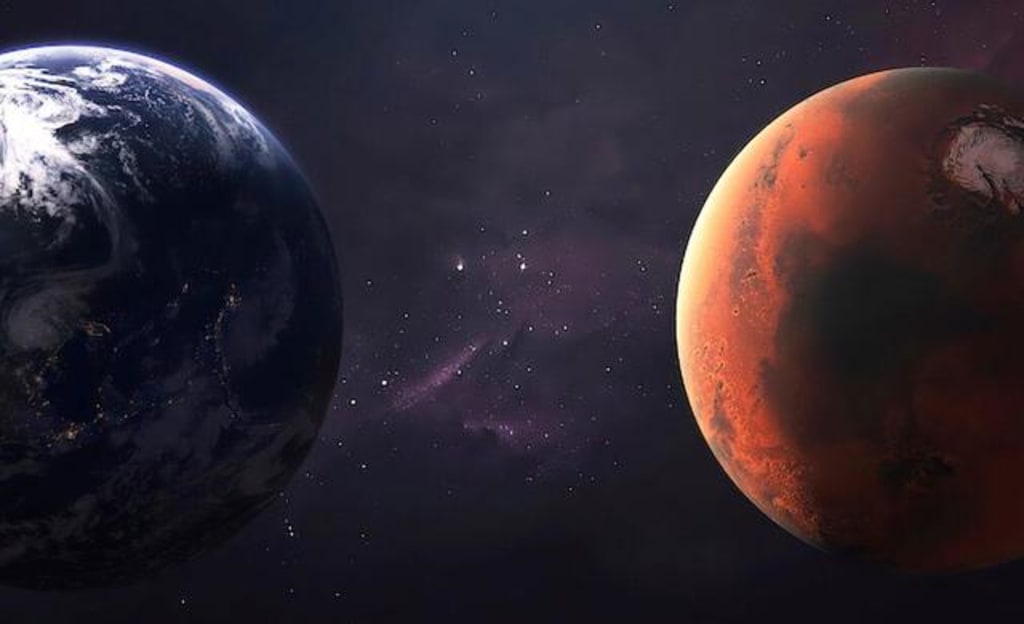The Earth's atmosphere is constantly losing
Will the future Earth become like Mars?

Kardashev RatingOf the eight planets in our solar system, Mars is the closest to Earth in terms of the natural environment, so it has rightly become a key exploration target for humans, who have launched many probes to Mars in the past and have harvested a large amount of Mars data.
All indications are that billions of years ago, Mars probably also had a thick atmosphere, vast oceans, and suitable temperature like Earth, and may have even evolved life, but because the core of Mars cooled early and therefore lost its magnetic field, this caused the solar wind to drive in, and then constantly "blow" the atmosphere of Mars away, and so the Martian atmosphere This caused the solar wind to drive in and "blow" the atmosphere away, so that Mars' atmosphere became thinner and thinner, and eventually Mars became what we see now.
The Earth has been able to maintain a thick atmosphere for a long time for two main reasons, one is that the Earth has enough gravity to bind a large amount of air, and the other is that the Earth has always had a hot core, its strong magnetic field can resist the solar wind, but also to bind the upper atmosphere of those air molecules are ionized ions formed.
However, scientists have found that although the Earth's gravity and magnetic field can play a very good role in protecting the atmosphere, the Earth's atmosphere is still losing, according to scientists' estimates, the rate of loss of the Earth's atmosphere is about 100,000 tons per year. Then the question arises, with the continuous loss of the Earth's atmosphere, the future of the Earth will become the same as Mars?
In general, the loss of the Earth's atmosphere is mainly through the following three ways.
1. Direct escape: We know that an object must have a second cosmic velocity to escape from the gravitational bondage of the Earth. Although the average rate of air molecules in the Earth's upper atmosphere is lower than the second cosmic speed, this is only an average, as the molecular motion continues, some of the gas molecules may gain enough kinetic energy in collision with other gas molecules and then escape directly from the top of the atmosphere.
2, charge exchange escape: in the Earth's upper atmosphere, due to the strong radiation of the sun, a large number of air is ionized and therefore produced a lot of fast enough ions, we can call them "fast ions", but in the Earth's magnetic field binding, these ions can not directly escape.
When the "fast ions" collide with the slower neutral particles in the Earth's atmosphere, it is possible to take away the electrons from these neutral particles, a process known as "charge exchange", and after gaining electrons, the "fast After gaining electrons, "fast ions" become fast enough neutral particles, the Earth's magnetic field no longer produce a binding effect, so they can escape from the Earth's gravitational field.
3, polar wind escape: Although the Earth has a strong magnetic field, it also has a weak point, that is, the poles of this magnetic field, this situation will cause the Earth's atmosphere ions can more easily move outward from the poles of the magnetic field, at the same time, the solar wind in this area can also be closer to the Earth's surface from the location of the "blow "In this way, the Earth's atmosphere is continuously lost.
Of the three pathways mentioned above, the lower the molecular weight of a gas molecule, the more likely it is to be lost. The main gases of the Earth's atmosphere are nitrogen and oxygen, which account for about 78.1% and 20.9% of the atmosphere, respectively. For these two relatively large molecular weight gases, their escaping quantities can be said to be so negligible as to be negligible.
The loss of helium and hydrogen from the Earth's atmosphere is largely due to the alpha decay of radioactive elements in the Earth's interior, which is very inactive and difficult to react with other substances, and therefore helium is constantly entering the atmosphere and is inevitably lost, even in the foreseeable future. become increasingly rare.
According to scientists' estimates, of the 100,000 tons of helium lost from the Earth's atmosphere each year, only about 1,600 tons are helium, while almost all the rest is hydrogen.
Hydrogen in the Earth's atmosphere comes from water and is produced in two ways: a small part of the water vapor in the atmosphere is "photolyzed", which simply means that short-wave radiation from the sun breaks the chemical bonds of water molecules, thus breaking them into hydrogen and oxygen; the other is ocean water, which may seep through cracks in the rocks under the sea into the underground and produce a series of chemical reactions with the hot magma and the crystalline bedrock therein, which in turn releases hydrogen gas.
Thus, as the Earth's atmosphere is lost, the amount of water on Earth will become less and less, but we do not need to worry about this, because there are about 13.6 billion tons of water on Earth, compared with such a huge amount of water reserves, the loss of 100,000 tons per year is not worth mentioning.
In addition, the Earth's water is not "only out but not in", because the Earth will from time to time from cosmic space capture a small amount of water-bearing material, and some small objects (such as comets, asteroids) will also bring water to the Earth from time to time, which will undoubtedly further reduce the amount of water loss on Earth.
In summary, although the Earth's atmosphere is constantly losing, this loss is very small, and the loss is not the main gases that make up the Earth's atmosphere, so in the foreseeable future, there will be no significant changes in the Earth's atmosphere, and the Earth will certainly not become the same as Mars.
About the Creator
Robert Jack
One of the secrets of emotional stability for adults is to keep the expectations of others to a minimum.
Enjoyed the story? Support the Creator.
Subscribe for free to receive all their stories in your feed. You could also pledge your support or give them a one-off tip, letting them know you appreciate their work.






Comments
There are no comments for this story
Be the first to respond and start the conversation.